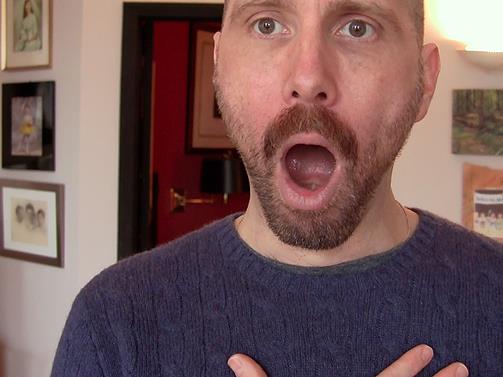David Thorpe wants to find his voice, though not in the manner the phrase commonly refers to. His isn’t a search for expression or identity, nor an effort to become empowered to say what he thinks, but an earnest attempt to change the way he speaks. Feeling disconnected from the pitch and rhythm he hears whenever he opens his mouth, he seeks a voice better synchronised with how he feels and how he sees himself.
Do I Sound Gay? chronicles his endeavour, with Thorpe acting as the first-person documentary’s subject and director. As the title intimates, much of his anxiety stems from his speech reflecting his sexual preference. An out gay man since his college years, a journalist, and an advocate for AIDS causes and other LGBTIQ concerns, he is aware of the many issues raised by his desire for a more traditionally masculine inflection rather than a stereotypically homosexual intonation, yet is driven to continue by his internal discomfort at the way he sounds.
Feeling alone and unloved after breaking up with his boyfriend sparks Thorpe into action, visiting two speech therapists, practising in his own home, and discussing the topic with celebrities and experts. He shapes his feature both chronologically and according to the rollercoaster his emotions take as he alternates between struggling with confidence, questioning his motivation, and embracing his efforts. Discovering why he sounds the way he does – and when his voice changed – is his driving factor, with chats with friends and family members helping to flesh out the more intimate side of his task. As he delves deeper, a second aim arises: understanding why he is so worried about the way he speaks, including the complicating social, political, and historical factors.
Placing personal problems within a cultural context can be a tricky feat, and while Do I Sound Gay? might not perfect the balance between capturing the first-time filmmaker’s introspection and examining the broader reasoning behind his wish for a different voice, the film does offer a spirited attempt at tackling the subject. Jumping between themes and interviewees throughout its 77-minute running time, the documentary pieces together engaging, educational snippets of information and insights, spanning the plight of today’s marginalised teens, the fetishisation of hypermasculinity, and the history of the queer accent in entertainment.
Less convincing is the plainly shot, choppily edited material – namely vox pops and conversations with famous participants – that surrounds the glimpses into Thorpe’s quest and is designed to complement the learnings he gleans along way. The former is fashioned to add man-on-the-street humour, and the latter star power; however as engaging a presence as George Takei, David Sedaris, Margaret Cho and Tim Gunn each provide in their brief appearances, they do little to boost the film’s argument.
Instead, as clichéd as it is, the feature’s real strength comes from the journey Thorpe takes, and the way he puts what he discovers about perception and prejudice into action. That he narrates the largely light-hearted film in his usual, unchanged tone may indicate the outcome of his soul searching and fact-finding mission, but by the time Do I Sound Gay? comes to a close, the timbre of his words has become an ode to self acceptance.
Rating: 3 stars out of 5
Do I Sound Gay?
Director: David Thorpe
USA, 2014, 77 mins
Revelation Perth International Film Festival
www.revelationfilmfest.org
July 2 – 12, 2015
Actors:
Director:
Format:
Country:
Release:





